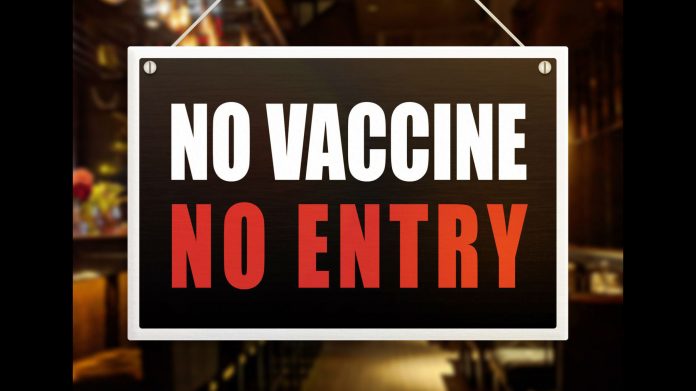
By Orville Williams
It was never touted as a potential last resort, in fact, the government staunchly refuted queries about the possibility, but come next Monday, all public sector workers in Antigua and Barbuda will be required to be vaccinated for Covid-19 if they are to continue working.
This development was announced yesterday, making the twin island state one of the first countries in the region to implement such mandates, and it was disclosed alongside a raft of other measures geared at arresting the spread of the virus, with the hope that herd immunity can be reached by the end of the year.
Previously, the public sector workers were allowed to choose between getting vaccinated and getting tested twice monthly, but the number of available testing kits and the number of available professionals to administer them has proven a strain on resources, resulting in the withdrawal of that policy and the implementation of more drastic measures.
According to this week’s post-Cabinet report, with effect from Monday, “all unvaccinated government employees including the public service, statutory corporations and companies in which the government owns majority shares shall be required to remain at home until proof of vaccination is provided”.
That message will no doubt be a bitter pill for government workers who remain vaccine hesitant or completely against the vaccine, but it gets worse just over a week after the aforementioned deadline.
The notes further state that, “As of Thursday, October 1, no public sector employees – inclusive of statutory corporations and of companies which the government holds majority shares – shall be paid a salary or wage for the period of non-compliance with the current policy.”
There was no date set for the end of these policies, meaning they will remain in effect for the foreseeable future or “until Cabinet is advised by health officials that the Covid-19 situation is under control”.
That “situation” refers to the ongoing spike in Covid infections and deaths, which is the worst the country has seen since the start of the pandemic.
Despite the increased risk, some unvaccinated individuals will be exempt from the new policy – at least initially – including employees of the Sir Lester Bird Medical Centre and those attached to the community clinics.
Information Minister Melford Nicholas explained that this particular exemption is meant to ensure the medical facilities are properly staffed to handle the current outbreak.
Other exemptions will be granted for medical and religious reasons, and those medically-exempt will be required to present twice monthly Covid tests to be allowed into work.
Effective October 1 as well, all eligible students 12 years and older will be required to be vaccinated against Covid-19, likewise all schoolteachers, before returning to face-to-face classes.
Bus drivers, conductors and taxi drivers will also be required to be vaccinated starting then, along with taxi drivers, vendors and merchants who ply their trade at the country’s ports of entry. Failure to comply with the current policy, the notes read, will result in restrictions to operate.
All arriving passengers, including returning nationals and residents, will be required to have received at least the first dose of a Covid vaccine approved by the country’s health authorities, also effective October 1.
Starting a bit earlier, on September 20, only vaccinated taxi operators will be allowed to operate at the VC Bird International Airport and also at Heritage Quay. Vendors, merchants and store clerks at both locations will, too, be required to be vaccinated.
As expected, the public reaction to these extraordinary measures has been swift and constant – particularly on social media – with hundreds of residents expressing both support and displeasure with the new policies.
The announcement has also prompted reaction from the local trade unions, that represent the occupational interests of the majority of public workers, and the opposing political parties who insist on ‘keeping the government on its toes’ in the interest of the wider population.
The groups expressed individual ‘shock’ and ‘confusion,’ primarily with the fact that these measures were decided and announced just ahead of a scheduled stakeholder consultation with the government on Thursday afternoon on the same matter.
The Democratic National Alliance (DNA) put out a statement, “disapproving” of the government’s mandatory vaccination policy and questioning the purpose of the subsequent consultation, “other than to provide a fig leaf of legitimacy for measures already decided upon”.
The United Progressive Party (UPP) similarly bashed the new measures, “rejecting” the policy as being totalitarian and pointing out that no mention was made of assistance for businesses or families that may be affected, via new or expanded social programmes.
Nevertheless, Prime Minister Gaston Browne doubled down on his administration’s stance at an event hours after the initial announcement.
“These mandates are designed to protect the entire population…I believe that, on the basis that these mandates are respected, Antigua and Barbuda will be well on its way to achieve herd immunity before the end of the year,” he said.
The PM declared that he has set a timeline of December 31 to achieve the feat, adding that stricter measures will be taken failing that.
“The mandates will not stop at what we agreed to [in Cabinet], because if we do not achieve herd immunity in the next few months, then additional mandates will be introduced,” he warned.
Along with the vaccine mandate, adjustments were made to some ‘social freedoms,’ with possibly the most impactful being as of September 20 beaches across the island will only be accessible to the public between 5am and 12pm.
Social gatherings will be restricted to members of the same household, starting October 1, and effective immediately, “all pleasure craft fetes, parties, entertainment events and excursions around the coastal waters and offshore islands are suspended until September 29”.
